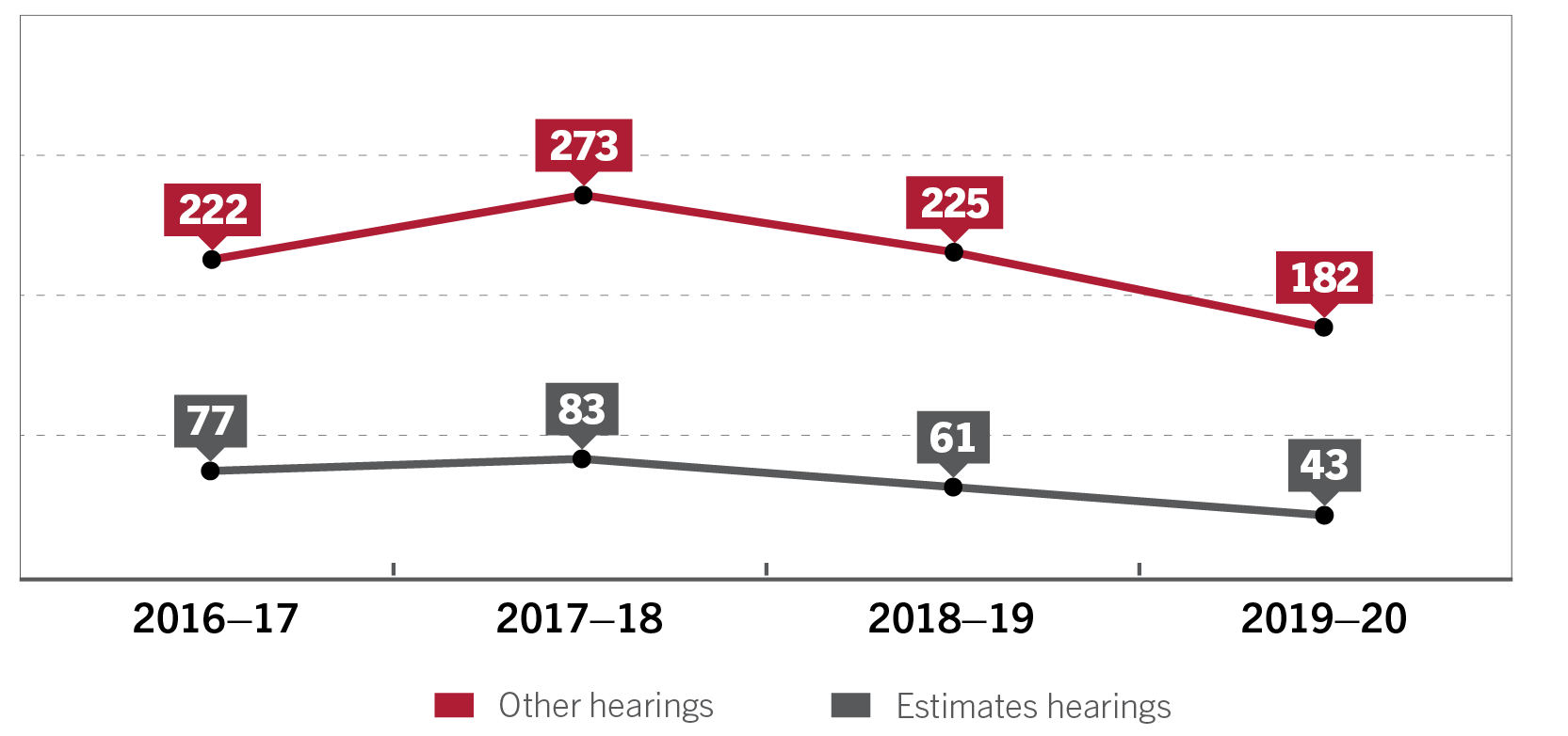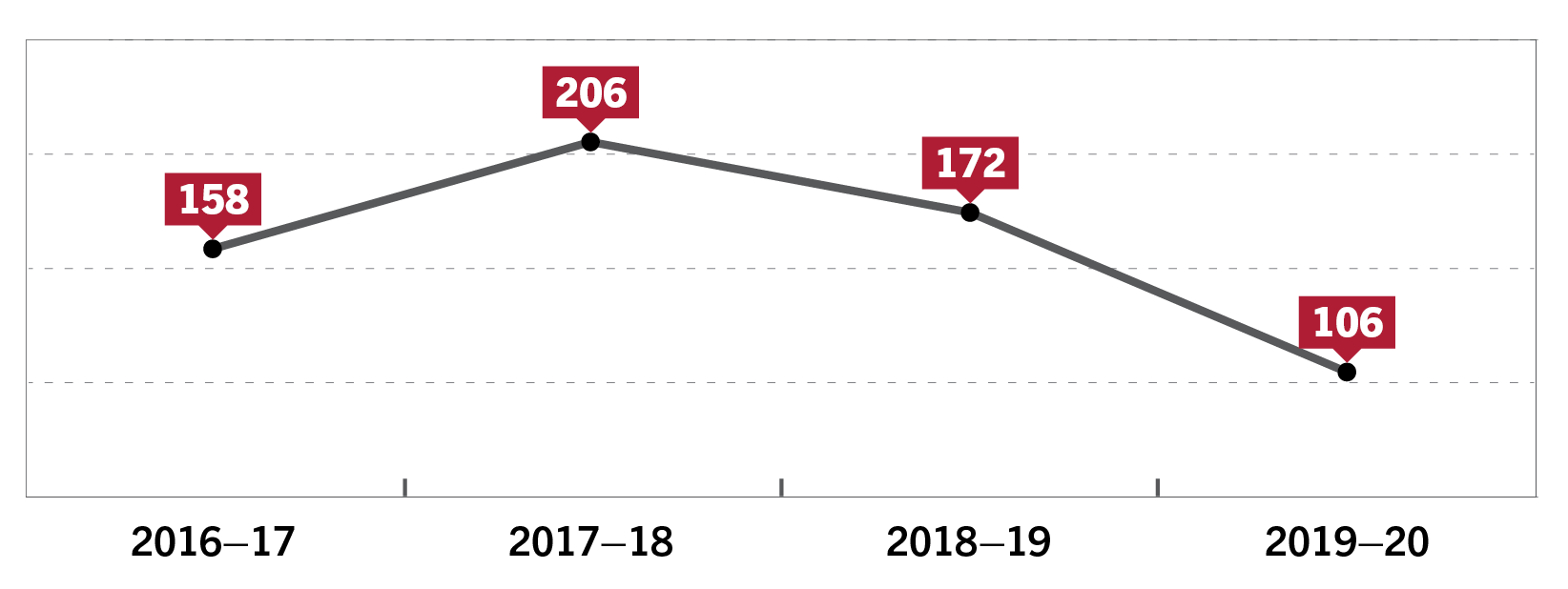| Outputs |
| Secretariat support and procedural advice to the legislative and general purpose standing committees, select committees, and certain joint committees. |
| Performance information |
Performance results |
| The degree of satisfaction of the chairs of committees, committee members and other senators with the quality and timeliness of advice and support. |
Formal and informal feedback, including reference to committee reports during debates in the Senate, shows that senators consider the support provided by the committee office to be effective. |
| Draft reports, reports and other documents are timely, accurate and of a high standard. Tabling deadlines are met. |
Accurate advice, documentation, and draft reports were provided to committees in accordance with their requirements.
Reports were drafted and presented to the Senate in accordance with the timeframes agreed by committees and deadlines set by the Senate.
|
| Inquiry information, evidence and reports are published promptly upon authorisation. |
Information was updated promptly and accurately on committee web pages. Submissions, other documents and reports were published consistent with the decisions of committees. |
| Inquiries from the public regarding committees are handled promptly and professionally. |
Telephone and email queries from the public were responded to promptly and accurately.
Members of the public had access to up to date, accurate and relevant material regarding committee activities and procedures.
|
Overview
Committee Office secretariats supported 16 legislation and references standing committees, nine Senate select committees, two joint select committees and five other joint committees (see figure 12). As in the previous year, secretariats experienced a demanding workload, with large numbers of inquiries and hearings taking place. The cost of the office in 2019–20 was $9.6m ($10.1m in 2018–19), with staff salaries comprising approximately 88 per cent of the office’s total expenses.
The remaining costs continued to be administrative (for example, printing, venue hire and transport and accommodation for secretariat staff attending hearings). These administrative costs reduced in the fourth quarter of the financial year due to the impact of the COVID-19 pandemic, largely as a result of a reduced number of interstate hearings.
Committee secretariats provided administrative support to committees, including processing submissions, publishing material to committee websites and arranging hearings around Australia. Staff analysed the evidence committees received, drafted briefing material and reports, arranged for the tabling and publication of reports, and assisted witnesses and others to participate in inquiries. In addition, secretariats provided procedural advice to chairs, committee members and other stakeholders.
While the impact of the COVID-19 pandemic reduced the number of interstate hearings in the last quarter of the year, the Committee Office workload was sustained, with committees pivoting quickly to hold hearings with a number of members of the committee and witnesses participating by video and teleconference.
Feedback from members of committees, made in the Senate when committee reports are tabled or debated, and provided informally during the course of the year, indicates that there are very high levels of satisfaction with the quality of the advice and support provided by secretariats.
Figure 12 – Elements and responsibilities of the Committee Office
| Executive |
|
Toni Matulick, Clerk Assistant
David Sullivan, Senior Clerk of Committees
Procedural advice and training.
Planning and coordination.
Secretariat staffing and resources.
Statistics and records.
|
|
Community Affairs
Jeanette Radcliffe
Economics
Mark Fitt
Education and Employment
Jane Thomson
(to 27 April 2020)
Alan Raine
(from 28 April 2020)
Environment and Communications
Stephen Palethorpe
Finance and Public Administration
Ann Palmer
Foreign Affairs, Defence and Trade
Lyn Beverley
Legal and Constitutional Affairs
Sophie Dunstone
Rural and Regional Affairs and Transport
Gerry McInally
Additional Support Unit
Lee Katauskas
|
Joint statutory
Australian Commission for
Law Enforcement Integrity
Sean Turner
Corporations and Financial Services
Patrick Hodder
Law Enforcement
Sean Turner
Joint standing
National Broadband Network
Lee Katauskas
National Disability Insurance Scheme
Bonnie Allan
Joint select
Australia’s Family Law System
Ann Palmer
Road Safety
Gerry McInally
|
Jobs for the Future in Regional Areas
Bonnie Allan
Effectiveness of the Australian Government’s Northern Australia agenda
Lee Katuaskas
Multi-Jurisdictional Management and Execution of the Murray Darling Basin Plan
Sean Turner
Financial Technology and Regulatory Technology
Lyn Beverley
Autism
Jane Thomson
(to 27 April 2020)
Alan Raine
(from 28 April 2020)
Foreign Interference through Social Media
Lee Katuaskas
Temporary Migration
Lee Katuaskas
Administration of Sports Grants
Jeanette Radcliffe
COVID-19
Jane Thomson
|
Activity levels and workload
The workload of the Committee Office is determined by decisions of the Senate and of the committees themselves. During this reporting period, the Committee Office continued to manage a significant workload in terms of the number of committees and inquiries supported. The highest number of inquiries managed at one time was 74 in February 2020.
Submissions, public hearings and witnesses
The significant work undertaken by committee secretariats during 2019–20 is evident in the administrative support provided to committees. This included processing 7,312 submissions, an increase of almost 2,000 submissions when compared with the previous reporting period. In addition, secretariats arranged 225 public hearings (including 43 estimates hearings) at which 4,323 witnesses appeared (including 1,967 witnesses at estimates hearings). Secretariats supported committees by arranging 545 private meetings and six site inspections.
Figure 13 – Number of committee hearings, 2016–17 to 2019–20

To manage this volume of work, the office continued to operate in a flexible manner with staff regularly working across secretariats, supporting different committees, and with staff from other programs within the department assisting when their workload permitted.
Estimates hearings
Supplementary estimates hearings took place in October 2019 and additional estimates hearings in March 2020. As shown in figure 13, there were 43 estimates hearings, down from 61 hearings in the previous period. This reduced number, when compared with the previous reporting period, was caused by the delay to the 2020 Budget estimates hearings which were scheduled to take place in May 2020. Due to the COVID-19 pandemic, these hearings have been postponed to October 2020.
References and reports
In addition to a considerable number of legislation inquiries, committees inquired into and reported on a diverse array of topics including the regulation of auditing in Australia; barriers to patient access to medicinal cannabis in Australia; the adequacy of Newstart and related payments; the provision of rescue, firefighting and emergency response at Australian airports; and the feasibility of a national traceability register for horses.
Figure 14 – Number of references to committees, 2016–17 to 2019–20
The office supported committees to table a total of 106 reports. Figure 15 indicates clearly how the election cycle influences the workload of Senate committees. The three low points in the graph coincide with election years and the impact of the COVID-19 pandemic.
Figure 15 – Reports presented by all committees supported by the Committee Office 2016–17 to 2019–20

Each committee report, while initially drafted by Committee Office staff is, in the end, a committee document which reflects the views of members of the committee undertaking the inquiry. Feedback indicates that despite the pressure created by the volume and short timeframe of many inquiries, the high standard of committee reports has been maintained. This was achieved through the dedication and expertise of secretariat staff, supplemented by support from staff of other areas of the department when required.
Activities following the commencement of the 46th Parliament
The commencement of a new parliament provided the opportunity for Committee Office staff to review and update internal manuals, policies and guidelines, and also information designed to support senators in their role conducting inquiries. The commencement of the 46th Parliament saw a number of committee secretaries and other Committee Office staff move to new secretariats as a way of building and sharing professional experience and expertise. Committee Office staff undertook significant work providing materials and support to assist new senators to engage with the work of committees.
Public information
The provision of information to the public about the work of Senate committees is an area of ongoing focus for the Committee Office.
The office continued to work with the Senate Public Information Office on projects to improve systems for writing reports and managing the high volume of submissions and answers to questions on notice provided to committees during estimates. Timely, accessible publication of committee evidence and reports supports the continual focus on improving public information and encouraging engagement with the work of committees.
Committee Office staff supported the department’s seminar program by delivering training sessions to public servants and other members of the public about the operation of Senate committees, as well as delivering training offered by the Parliamentary Library for parliamentary staff.
International engagement
Committee Office staff presented information to international delegations visiting Australia. The support that committee secretaries provide to outgoing parliamentary delegations was suspended in 2020 due to the COVID-19 pandemic.
Management and leadership
Under standing order 25(10) a Chairs’ Committee, comprising the chairs of standing committees and Senate select committees, may be convened by the Deputy President to discuss any matter relating to the operations of those committees. The Clerk Assistant (Committees) is the secretary. During 2019–20, this committee met to consider issues including levels of committee activity and satisfaction of senators with committee support processes.
Committee secretaries also met regularly throughout the year to discuss corporate and administrative issues and procedural matters.
Performance outlook
The 2019–20 reporting period saw the Committee Office support a large number of inquiries. Despite the uncertainty and reduction in committee travel as a result of the COVID-19 pandemic, the office continued to deliver high levels of support to committees including the processing of almost 2,000 more submissions when compared with the previous reporting period. Similar levels of activity are expected in 2020–21, with many committee meetings and hearings to take place using telephone and videoconference facilities.